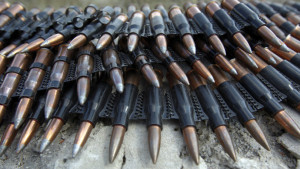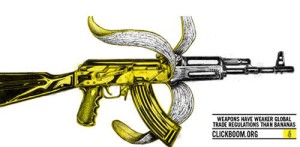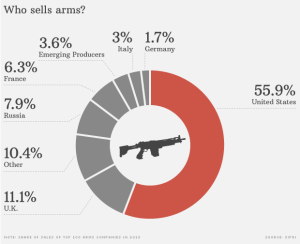Armed conflict has been responsible for more than 231 million deaths in the last century. The nature of the arms trade has intensified this conflict (A.B., The Economist).
The line between the formal arms trade and the black market is entirely ambiguous. Lax enforcement has contributed to unfathomable human suffering and violence throughout the globe. Often there is a relationship between a country’s department of defense and major arms producers as well as a relationship between their intelligence community and illegal dealers.
The last figures on the arms trade, recorded in 2003, show that it is liable for 40% of all corruption in world trade. Corruption that is systematic and perpetuated by leading nations. In 2006, former UK Prime Minister Tony Blair halted an investigation into the largest-ever arms deal, the al-Yamamah deal, which began under Prime Minister Margret Thatcher’s government in the late-1980s. The deal between the UK and Saudi Arabia was estimated around $7.4 billion in commissions paid on the deal alone. Mark Thatcher, the Prime Minister’s son, allegedly made 14.8 million as a broker on the deal (Castle, Independent).
Similar controversies and questions over corruption have been raised in the United States. For instance, former Vice President Dick Cheney, was the CEO of Halliburton before taking office. Halliburton [and its subsidiary KBR, Inc.], is a name practically synonymous with war profiteering, acquiring billions of dollars in new business thanks to non-existent weapons of mass destruction and U.S. noncompetitive government contracting-practices. Due in part to a consolidation trend during the 1990s, the company is one of the 5 largest firms in the US, which account for 44% of the industry’s market share. Not to mention that campaign contributions on behalf of private defense contractors are large enough to keep many lawmakers in complacent support of costly militaristic projects (A.B., The Economist).
After 9/11, private military contracts in the US rose from $145 billion in 2001 to $390 billion by 2008 under the Bush administration (Lawson).
Political will and greater transparency are viable conduits in reducing the corruption that lie within the arms trade market. The UN has attempted to do something about it putting forth a global Arms Trade Treaty [ATT] approved by over 150 countries in April of 2013. The treaty went into action in December of 2014 and prohibits arms trade that would facilitate genocide, crimes against humanity and war crimes. It continues to grapple with the regulation of international trade of conventional weapons and countries like the US and UK, which both spend considerably large amounts on defense budgets, have failed to ratify the treaty.
The United States military spending, at $598.5 billion, accounted for 54% of the nation’s spending in 2015. That’s approximately $2000 for every US citizen, in one year alone. The US is also a top supplier of major conventional weapons trading 31% share of the global arms exports to ally nations. Arms exporters commonly only consider the impact of exporting on their own welfare and fail to consider the impact and possible negative externalities that may arise from trading with another nation. Other abstainers include China and Russia, major arms exporters and importers like Saudi Arabia and Egypt (A Killer Deal, The Economist).
“Every gun that is made, every warship launched, every rocket fired signifies, in the final sense, a theft from those who hunger and are not fed, those who are cold and are not clothed. The world in arms is not spending money alone. It is spending the sweat of its laborers, the genius of its scientists, the hopes of its children… This is not a way of life at all, in any true sense. Under the cloud of threatening war, it is humanity hanging from a cross of iron.” – Former U.S. President, Dwight D. Eisenhower
Wars have a dirty habit of making companies and private interest groups billions of dollars. Maintaining a highly militarized defense industry will continue to remain vogue as long as there are profits to be made.
Sources:
http://www.economist.com/blogs/prospero/2011/11/quick-study-global-arms-trade
The economics of arms trade and arms control – University of Kent
http://www.rollingstone.com/politics/news/the-stoner-arms-dealers-20110316



Leave a Reply
You must be logged in to post a comment.